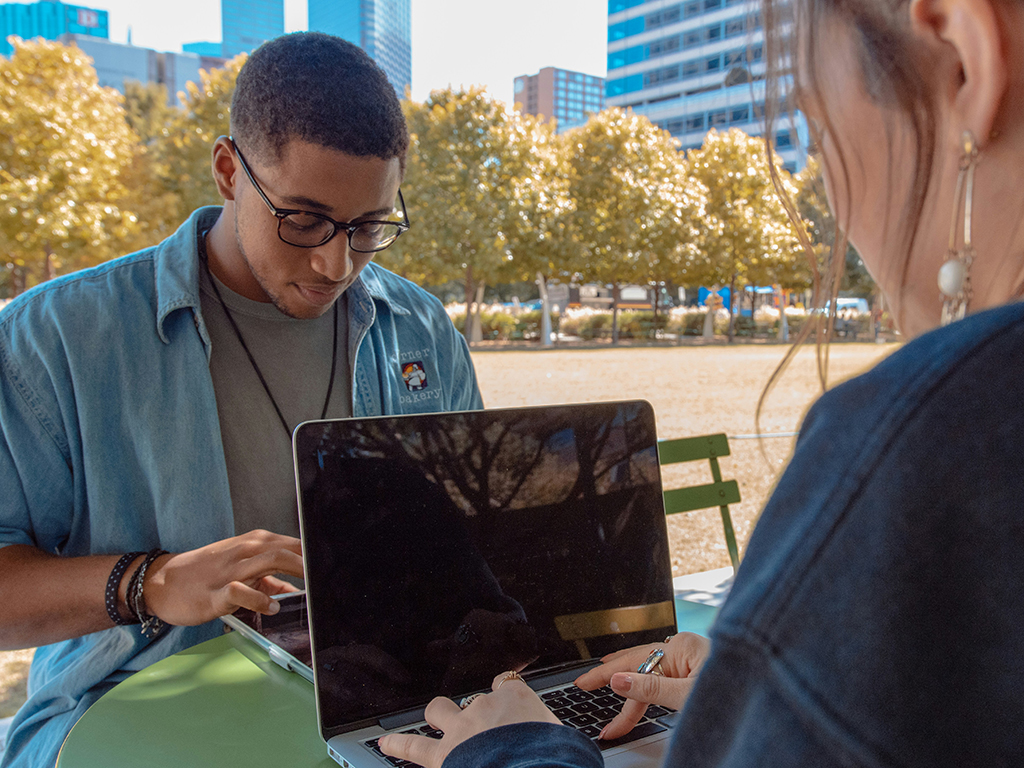Why Become a Mentor?
Mentorship isn’t just about helping others—it’s also about growing as a leader. As a mentor, you will:
- Gain valuable leadership and communication experience.
- Build your resume by showcasing your commitment to service and community.
- Create meaningful relationships with fellow NSCS members.
- Leave a lasting legacy by helping others succeed.

What to Expect from the NSCS Mentor Program:
NSCS has partnered with Ambition In Motion to provide a structured, impactful mentorship program. The program is designed to be low time-commitment and high reward, so you can mentor effectively while managing your busy schedule.
- Time Commitment: About 12 hours total, February to May.
- Your Role as a Mentor:
- Engage in three 30-minute conversations with your mentee (via phone, video, or in-person).
- Offer guidance on academics, career planning, and personal development.
- Attend four Ambition In Motion workshops to enhance your mentoring skills.
Why Your Role Matters:
As an NSCS mentor, you’ll help shape the future of our community by empowering other members to achieve their full potential. Your advice and support could be the key to unlocking a mentee’s success.
How to Sign Up:
Becoming a mentor is simple! Complete your application by February 25, 2025, and NSCS will match you with a mentee shortly after.
- There’s no cost to participate.
- All training and resources will be provided through the program.
Ready to take on this rewarding role? Click here to sign up to become a mentor today!
Take the next step in your NSCS journey by becoming a mentor this spring. This is your chance to lead, inspire, and make a difference in the lives of fellow NSCS members. Join the NSCS Mentor Program today and create an impact that lasts far beyond this semester.
Gratitude isn’t just a nice feeling—it’s a practice that supports your mental health, enhances your focus, and boosts your resilience. Here’s how a Gratitude Jar can make a real difference as you navigate the final stretch of the semester.

How Gratitude Helps You End the Semester Strong
- Boosts Your Motivation
When you take a moment to acknowledge small victories—like completing a challenging assignment or having a meaningful conversation—it reinforces your sense of progress. This helps you stay motivated to tackle the next challenge. - Reduces Stress
Gratitude shifts your mindset, encouraging you to focus on what’s going well rather than what’s overwhelming you. This mental reset can lower stress levels and improve your ability to concentrate. - Fosters Resilience
Reflecting on positive moments, even during tough times, reminds you of your capacity to handle challenges. It’s a practice that builds emotional strength and keeps you moving forward.
How to Create Your Gratitude Jar
- Choose Your Jar
Use any container—a mason jar, a decorated box, or even a coffee mug. If you like, personalize it with stickers, quotes, or designs that inspire you. - Start Writing Gratitude Notes
Cut up small pieces of paper or grab sticky notes. Each day, write down one thing you’re grateful for. It could be academic progress, a kind gesture, or even a small joy like your favorite coffee.
Examples:
- “Grateful for my professor’s extra office hours before the big exam.”
- “Thankful for my roommate helping me proofread my paper.”
- “Appreciate how the sunshine made my walk to class better today.”
- Use It as a Study Break
When finals stress starts to build, pause to add something to your jar. This practice serves as a mindfulness exercise, giving you a chance to refocus and find balance. - Make It a Shared Practice
Invite your friends or study group to create their own Gratitude Jars, or even share gratitude notes with each other. This can build a sense of connection and mutual support. - Reflect and Recharge
At the end of the semester, take time to read through your Gratitude Jar. Reliving these moments can provide a sense of accomplishment and remind you of all the positives that carried you through.
Why It Works
A Gratitude Jar isn’t just a feel-good activity—it’s a powerful tool for self-care. By making gratitude part of your daily routine, you’re training your brain to focus on the positives, which can improve your mental health, increase your energy, and help you stay motivated through stressful periods.
As finals wrap up and the semester closes, you’ll have a tangible reminder of the good that happened, even during busy and challenging times. This simple practice helps you finish strong—not just academically, but emotionally and mentally as well.
Try starting your Gratitude Jar today and see how it transforms your mindset as you power through the final weeks of the semester.
]]>1. Treat It Like a Job
When listing volunteer work, structure it as you would any job or internship. Include the organization name, your role, location, and dates of service. For example:
Volunteer Coordinator, Habitat for Humanity
Washington, DC | June 2022 – August 2023
2. Focus on Transferable Skills
Employers want to see how your volunteer work prepared you for their role. Did you develop leadership skills by coordinating events? Strengthen your communication abilities by working with diverse groups? Use bullet points to clearly outline your contributions and achievements.
For instance:
- Managed a team of 10 volunteers to complete housing construction projects on schedule.
- Facilitated workshops on homeownership for underserved families, improving community awareness.
3. Quantify Your Impact
Numbers catch attention. Wherever possible, include metrics to showcase the scale or results of your efforts.
Instead of saying:
“Organized fundraising events.”
Say:
“Organized three fundraising events that raised $25,000 to support local education programs.”
4. Highlight Leadership and Teamwork
If you held a leadership position or played a key role in group activities, emphasize this. Employers value individuals who can lead and collaborate.
For example:
- Led a weekly mentorship program for 15 high school students, increasing graduation rates by 20%.
- Collaborated with a team of five to design and implement a sustainable food drive system for the campus community.
5. Tailor Your Experience to the Job Description
Not all volunteer experiences need to be listed. Choose the ones most relevant to the position you’re applying for. If the job emphasizes customer service, highlight volunteer roles where you engaged with the public. If the role values project management, showcase your organizational contributions.

6. Include Volunteer Experience in Multiple Sections
Volunteer experience doesn’t need to be confined to a single section of your resume. Depending on its relevance, you can:
- List it under “Work Experience.”
- Create a separate “Volunteer Experience” section.
- Include it in “Skills” or “Leadership Activities.”
7. Use Action Words
Make your resume dynamic by starting each bullet point with strong action verbs such as “organized,” “led,” “facilitated,” or “developed.” This conveys initiative and impact.
8. Showcase Long-Term Commitments
Consistent, long-term volunteer work demonstrates dedication and time management. Employers may view this as an indicator of reliability and passion.
9. Mention Soft Skills
Volunteering often develops soft skills like empathy, adaptability, and problem-solving. If these align with the job, be sure to highlight them in your resume or cover letter.
10. Leverage NSCS Opportunities
As an NSCS member, you have access to exclusive service opportunities and leadership roles. These experiences not only build your resume but also set you apart by showing your dedication to academic excellence and community engagement.
A well-crafted resume can turn your volunteer experience into a powerful career asset. By tailoring your contributions to fit the roles you’re applying for, you can show employers that your commitment to service goes hand in hand with professional growth.
]]>What is Semester at Sea?
Semester at Sea is a unique study abroad program that offers students the opportunity to travel the world while earning academic credits. Students live and learn aboard a ship that takes them to 10 to 12 different countries over the course of a semester. With a curriculum designed to promote cross-cultural understanding and global awareness, Semester at Sea provides an unparalleled educational experience that combines academic coursework with hands-on learning in different international destinations.
The NSCS Semester at Sea Scholarship makes this incredible opportunity possible for students, allowing them to explore new cultures, broaden their academic horizons, and gain valuable life experiences.
Meet Our Scholarship Recipients:

Haley Middleton
The University of Georgia
Award: $10,000
“Since looking into Semester at Sea, I’ve researched countless ways to help fund my study abroad, but the chances of going were slim. Receiving the NSCS Semester at Sea Spring Award provides the financial relief I was searching for, and I couldn’t be more grateful. Being able to attend this study abroad seemed too good to be true, but now with this award, it’s within my reach. This scholarship makes it possible for me to experience diverse cultures, new destinations, and different perspectives that will enrich my education and further my personal and professional growth. I’m excited to learn from the SAS faculty and meet new friends from around the world, making memories that will last a lifetime. I wouldn’t have been able to go on Semester at Sea without this, so thank you to the National Society of Collegiate Scholars for making my dream to study abroad a reality.”
Riley Talmage
University of Twin Cities
Award: $10,000
“I truly cannot express how much this scholarship means to me. The generosity of NSCS will allow my Semester at Sea experience to be less stressful and more adventurous; it is because of them that I will be able to say yes to experiences and opportunities I may not have otherwise. My dream of not just seeing, but actually experiencing the world, will be that much more attainable, and I will be forever grateful to NSCS for believing in both me and my boundless aspirations as I embark on this journey of a lifetime.”


Sara Christ
The University of Texas at Austin
Award: $5,000
“Receiving the NSCS Semester at Sea Spring Scholarship is both a tremendous honor and a meaningful opportunity that will greatly impact my academic and personal journey. This scholarship means more than just financial support; it offers the opportunity to engage in a global classroom where learning reaches far beyond traditional textbooks. It allows me to fully immerse myself in a once-in-a-lifetime opportunity to experience diverse cultures firsthand, engage in global learning, and develop a deeper understanding of the interconnectedness of our world, growing both academically and personally in ways that wouldn’t be possible in a traditional setting. As an advertising student, the ability to see the world through new eyes is invaluable. Semester at Sea will allow me to explore how cultural nuances influence communication and creativity, helping me become a more thoughtful and well-rounded professional. I’m immensely grateful to NSCS for recognizing my potential and helping me take part in a program that will undoubtedly shape my future. This scholarship has empowered me to embrace this journey wholeheartedly, and I’m excited to learn from the world in ways I’ve never imagined.”
Emily Cates
Auburn University
Award: $5,000
“Semester at Sea will be a once-in-a-lifetime opportunity to travel the world, form meaningful connections with people I would never have met otherwise, and I know it will shape me in ways that a traditional classroom experience cannot. Receiving this scholarship means so much to me because it recognizes and eases some of the cost of this program. I am excited about my upcoming journey and grateful to receive an NSCS Scholarship.”


Christy Knabe
The University of Texas at Austin
Award: $5,000
“Receiving the Semester at Sea scholarship from NSCS has been an amazing gift in my life. This scholarship not only helps cover the costs of my final semester of college, but also makes my dream of going on Semester at Sea a reality. This journey will let me explore new cultures and gain experiences that will shape my future. I’m really thankful for this support, and I can’t wait for the adventures and learning that lie ahead. Thank you, NSCS, for making this opportunity possible!”
Olivia Tosto
Global Chapter (College of DuPage)
Award: $5,000
“Receiving the NSCS Semester at Sea Scholarship has truly been a life-changing experience. It has given me the incredible opportunity to pursue my academic ambitions while traveling the world and expanding my horizons. Words cannot express the depth of my gratitude to the National Society of Collegiate Scholars for granting me this once-in-a-lifetime chance. I am deeply honored to have been selected for this scholarship, which represents my commitment to believing in myself and continuously pushing beyond my comfort zone. This experience will shape both my personal growth and future career.”

NSCS is proud to support these exceptional students as they embark on their global academic journey with Semester at Sea. Their stories reflect the transformative power of the NSCS Semester at Sea Scholarship, which enables students to gain firsthand exposure to new cultures and global issues while continuing their academic pursuits. Congratulations to all our scholarship recipients!
]]>The Value of Leadership in College
1. Building Confidence
Taking on leadership roles in college allows students to step outside their comfort zones and build confidence. Whether it’s running a student organization or leading a group project, these experiences teach students how to trust their instincts and navigate challenges independently.
2. Enhancing Problem-Solving Skills
Leaders are problem solvers. In college, this could mean coming up with creative solutions to academic challenges, balancing club responsibilities, or addressing group dynamics. Developing this skill helps students approach complex issues in their future careers with a calm and strategic mindset.
3. Effective Communication
Leadership roles demand clear and effective communication, whether you’re delegating tasks, making presentations, or coordinating events. These experiences refine your ability to convey ideas persuasively and ensure everyone is on the same page—skills that are crucial in both professional and personal relationships.
4. Time Management and Prioritization
Leading a group or managing responsibilities within an organization often requires strong time management. Balancing multiple tasks—whether academic, social, or organizational—helps you develop the ability to prioritize effectively, a skill that becomes invaluable in the fast-paced professional world.
5. Preparing for the Workforce
Employers seek candidates with leadership experience because they know these individuals can take initiative, work well with others, and manage responsibilities efficiently. Being able to demonstrate leadership skills makes you stand out during interviews and can open doors to internships, jobs, and promotions.
How NSCS Helps Foster Leadership Skills

NSCS (National Society of Collegiate Scholars) offers multiple opportunities for members to enhance their leadership skills, ensuring they graduate not only with academic knowledge but also with real-world experience.
1. Leadership Roles within NSCS
As an NSCS member, you have the opportunity to serve in leadership roles within your chapter. From President to VP positions, these roles allow you to spearhead initiatives, manage teams, and engage with both your peers and the wider community. This hands-on experience is invaluable in honing your leadership capabilities.
2. Community Service Initiatives
Leadership isn’t just about holding titles; it’s about making a difference. NSCS encourages members to get involved in community service projects, offering the chance to lead initiatives that positively impact society. These experiences teach valuable lessons in empathy, team management, and responsibility.
3. Access to Mentorship
One of the greatest assets to leadership development is mentorship, and NSCS provides members access to experienced mentors who can offer guidance. Learning from someone who’s been in your shoes helps you avoid pitfalls and adopt successful leadership practices early on.
Leadership skills developed in college don’t just stay on campus—they extend into every aspect of life. From boosting your confidence to preparing you for career success, the ability to lead is an essential tool that sets you apart. Through its leadership roles, community projects, and mentorship, NSCS helps students build and refine these skills, ensuring that when the time comes to take the next step, you’re more than ready.
Leadership is not just a role—it’s a mindset, and there’s no better time to start developing it than during your college years.
]]>1. Start with Your Professors: Building Academic Relationships
Professors can be some of your most valuable connections in college. They bring a wealth of knowledge, experience, and often have connections in your field of interest. To establish a good relationship with your professors:
Attend Office Hours Regularly: Don’t wait until you need help with an assignment or exam. Use office hours to discuss topics that interest you, ask about research opportunities, or seek advice on your academic path. Showing genuine interest in their subject can lead to mentorship opportunities.
Engage in Class: Actively participating in class discussions not only helps you stand out but also shows your professors that you’re committed to learning. This engagement can open doors for deeper conversations outside of class.
Follow-Up After Meetings: After meeting with a professor, whether in their office or after class, send a thank-you email. This reinforces your interest and helps keep the conversation going.

2. Networking with Peers: Building a Supportive Community
Your peers are on the same journey as you, and building relationships with them can provide support, collaboration opportunities, and lifelong friendships. Here’s how you can network effectively with fellow students:
Join NSCS Events and Chapter Meetings: NSCS chapters host various events throughout the year, from social gatherings to service projects. These events are perfect for meeting like-minded students and expanding your network within the organization.
Form Study Groups: Collaborating with peers in study groups can enhance your learning experience and help you tackle challenging subjects together. Plus, it’s a great way to make friends and establish connections that go beyond the classroom.
Engage in Campus Activities: Participating in clubs, sports, or other extracurricular activities allows you to meet students from different backgrounds and disciplines. These connections can broaden your perspectives and enrich your college experience.
3. Find a Mentor
Finding a mentor can be one of the most impactful steps you take in your college career. Mentors can provide guidance, offer insights into your field of interest, and help you navigate the challenges of academia and beyond.
Engage in the Ambition in Motion Program: NSCS is launching a Mentorship Program connecting students and alumni for professional guidance. This program pairs students with NSCS alumni who are eager to provide career advice and gain volunteer experience. The program offers a Collegiate program for current students and an Alumni program for professionals. Don’t miss out on this valuable opportunity—sign up here by September 24, 2024, to participate.
4. Leveraging NSCS Resources for Networking
As an NSCS member, you have exclusive access to resources that can enhance your networking efforts:
Utilize LinkedIn: Make sure your LinkedIn profile is up to date and reflects your NSCS membership certificate. Connect with professors, peers, and NSCS members to build a professional online network that can support your career aspirations.
5. Cultivating Long-Term Relationships
Networking isn’t just about making connections—it’s about nurturing them over time. Here’s how you can maintain and strengthen the relationships you build:
Stay in Touch: Regularly check in with professors and peers, even after a class or project has ended. Send updates on your progress, share interesting articles, or simply ask how they’re doing.
Be Genuine: Authenticity is key to building meaningful connections. Be yourself, show genuine interest in others, and offer help when you can. People appreciate sincerity and are more likely to want to maintain a relationship with you.
Give Back: Networking is a two-way street. Offer your support to others, whether it’s helping a classmate with an assignment or sharing job leads with your peers. By giving back, you create a positive reputation that strengthens your network.
Make This Year Count
As you embark on a new academic year, remember that the connections you build can shape your college experience and beyond. Whether it’s through developing strong relationships with your professors, forming a supportive network of peers, or finding a mentor to guide you, each step you take brings you closer to achieving your goals. By actively engaging in these opportunities, you’re setting the foundation for success both during college and in your future career. Make this year one of growth, learning, and meaningful connections.
]]>1. Prioritize and Plan
Effective time management is key. Start by listing all your academic and extracurricular commitments, then prioritize them based on deadlines and importance. Use planners, calendars, or digital tools to schedule your time. Having a clear plan helps prevent last-minute stress and ensures you allocate enough time for each task.
2. Set Realistic Goals
Set achievable goals for both your academic and extracurricular pursuits. Break down larger tasks into smaller, manageable steps. For example, if you have a research paper due, set milestones for completing the outline, research, and writing. Similarly, if you’re organizing an NSCS event, outline the planning stages and assign deadlines for each.
3. Develop Efficient Study Habits
Maximize your study time by employing effective study techniques. Find a quiet, distraction-free environment and use methods like the Pomodoro Technique to maintain focus. Summarize your notes, create flashcards, and practice active recall to enhance retention. Additionally, forming study groups with fellow NSCS members can provide mutual support and motivation.
4. Communicate with Professors
Building strong relationships with your professors can be beneficial. Attend office hours to seek clarification on course material and discuss any concerns you may have. Inform them about your involvement in NSCS and other activities, as they may offer advice on balancing your commitments or provide flexibility when needed.

5. Utilize Campus Resources
Take advantage of the resources available on campus. Academic advising, tutoring centers, and writing labs can offer valuable support. Additionally, NSCS often provides resources and workshops on topics such as time management, leadership, and academic success. Participating in these can enhance your skills and help you stay on track.
6. Practice Self-Care
Maintaining your well-being is crucial for success. Ensure you get enough sleep, eat nutritious meals, and exercise regularly. Schedule downtime to relax and recharge. Balancing your physical and mental health with your academic and extracurricular commitments will improve your overall performance and prevent burnout.
7. Learn to Say No
It’s important to recognize your limits and avoid overcommitting. While it’s great to be involved, taking on too many responsibilities can lead to stress and decreased performance. Be selective about the activities you participate in and focus on those that align with your goals and interests.
8. Leverage Your NSCS Network
One of the benefits of NSCS membership is the opportunity to connect with like-minded peers. Engage with fellow members who are also balancing academics and extracurriculars. Share tips, support each other, and collaborate on projects. Your NSCS network can provide valuable insights and encouragement.
9. Reflect and Adjust
Regularly reflect on your progress and adjust your strategies as needed. If you find certain commitments are overwhelming, reassess and reallocate your time. Flexibility and adaptability are essential for maintaining a healthy balance.
10. Embrace Leadership Opportunities
NSCS offers numerous leadership opportunities that can enhance your skills and experiences. Taking on leadership roles can teach you valuable time management, organizational, and interpersonal skills. These roles can complement your academic journey and provide a well-rounded college experience.
Balancing academic excellence with extracurricular activities is a dynamic process that requires planning, discipline, and self-awareness. By prioritizing your commitments, setting realistic goals, and utilizing the resources available to you, you can thrive in both your academic and extracurricular pursuits. Remember, your involvement in NSCS not only enhances your college experience but also prepares you for future success.
]]>Leadership Skills Development
NSCS offers numerous programs, workshops, and strength assessment tests designed to develop and enhance your leadership skills. Participating in these opportunities helps you build a strong foundation in leadership, which is highly valued by employers. Developing your ability to lead and inspire others not only sets you apart in the job market but also prepares you for leadership roles in your future career.
LinkedIn Certificate
One of the standout benefits of NSCS membership is the LinkedIn certificate you can earn. This certificate is a valuable addition to your LinkedIn profile and resume, highlighting your commitment to academic excellence and leadership. It makes you stand out in a competitive job market, as potential employers can easily see your dedication and achievements, increasing your chances of securing job interviews and offers.
Career Tools
NSCS provides access to exclusive career tools and resources tailored to help you succeed in your future career. These tools include resume-building workshops, interview preparation sessions, and job search strategies, all designed to give you a competitive edge. By utilizing these resources, you can effectively navigate the job market, present yourself confidently to potential employers, and secure positions that align with your career goals.
Networking Opportunities
Connecting with a network of 1.5 million lifetime NSCS members through the member-only portal opens up a world of opportunities. These connections can lead to mentorships, job offers, and professional collaborations. Networking with fellow members provides valuable insights, support, and guidance, which can be instrumental in your career development and advancement. Building these connections early on can lead to lifelong professional relationships and support networks.
Mentoring
Participating in the Planning to Achieve Collegiate Excellence (PACE) Program and K12 mentoring programs allows you to develop and enhance your leadership and communication skills. Mentoring younger students not only helps them achieve their academic goals but also provides you with a sense of fulfillment and purpose. These experiences are valuable additions to your resume and demonstrate your commitment to giving back to the community, which is attractive to potential employers.
NSCS membership offers a comprehensive suite of benefits that can significantly enhance your post-college planning and career success. From leadership development and career tools to networking opportunities and mentoring, NSCS provides the support and resources you need to confidently step into your future and achieve your professional aspirations. Embrace the opportunities provided by NSCS and chart a successful path to your career goals.
]]>Peer mentorship is a supportive relationship where students at similar stages in their academic journey help each other out. It’s different from traditional mentoring, where an experienced person guides a less experienced one. In peer mentorship, everyone is on a more equal footing, sharing tips, advice, and encouragement based on shared experiences.
Time Commitment
The time commitment for peer mentorship can be flexible. Usually, it involves meeting once a week or every other week for about an hour. However, you and your mentor can decide on the meeting schedule that best suits both of your needs. Consistency is key, but it doesn’t have to take up too much of your time.
How to Get a Peer Mentor
Finding a peer mentor is easier than you might think. Here’s how to start:
Know What You Want: Think about what you want to achieve through peer mentorship. This will help you find someone whose experiences match your goals.
Join Clubs and Groups: Get involved in clubs, study groups, or organizations related to your interests. These are great places to meet potential mentors.
Network: Attend campus events, workshops, and social gatherings. Don’t be afraid to introduce yourself and ask for advice.
Use Online Platforms: Websites and apps like LinkedIn, university forums, and social media groups can help you connect with peers who are also looking for mentorship opportunities.
Be Proactive: Reach out to classmates or upperclassmen who you think could be good mentors. A polite and clear message about your interest in peer mentorship can go a long way.
Examples of Peer Mentorship Opportunities
Academic Mentorship
If you’re undecided on a major, connecting with a peer mentor who has already chosen a major could be incredibly helpful. They can share insights on why they chose their major, what the coursework is like, and what career opportunities are available.

Internship Guidance
Finding a peer mentor who has already secured an internship in your desired field can be invaluable. They can offer advice on how to apply, what to expect during the interview process, and how to make the most of your internship experience.
Extracurricular Activities
Joining extracurricular activities can also provide opportunities for peer mentorship. For instance, a senior member of a club or organization can guide you on how to take on leadership roles, organize events, and balance extracurricular activities with academic responsibilities.
Benefits of Peer Mentorship
Study Skills and Exam Preparation
A peer mentor who excels in your courses can share effective study techniques, provide notes, and help you prepare for exams. They can also recommend resources and study groups that have helped them succeed.
Career Planning
A peer mentor with a clear career path can offer advice on setting career goals, building a resume, and networking with professionals in your field. They can also share their experiences with job searches and interviews, giving you a better understanding of what to expect.
Enhanced Learning and Knowledge Sharing
Peer mentorship is a fantastic way to boost your learning. By sharing notes, study tips, and insights, both mentors and mentees can deepen their understanding of subjects and improve their academic performance. It’s like having a study buddy who’s invested in your success.
Improved Communication Skills
Being part of a peer mentorship program helps you develop better communication skills. Mentors learn to explain concepts clearly, while mentees practice active listening and asking good questions. These skills are not only useful in college but also in your future career.
Increased Confidence and Self-Esteem
Having a peer mentor can make you feel more confident and less stressed. Knowing that someone who’s been in your shoes is there to support you can be really reassuring. Mentors also gain confidence from helping others and seeing their mentees succeed.
Stronger Network and Community
Peer mentorship helps you build a strong support network on campus. You’ll make new friends and connections, creating a sense of community. These relationships can last beyond college and help you in your future career.
Personal and Professional Development
Both mentors and mentees grow personally and professionally through peer mentorship. You’ll get advice on how to achieve your goals, and mentors will develop leadership and coaching skills. This mutual growth is beneficial for your future job prospects and personal fulfillment.
Motivation and Accountability
A peer mentor can be a great motivator. They can help you set goals and stay on track to achieve them. Knowing that someone is there to support you and hold you accountable can keep you focused and motivated.
Adaptable and Flexible Learning
Peer mentorship is more adaptable and flexible than traditional mentoring. Since mentors and mentees are at similar stages, they understand each other’s challenges better. This makes the mentoring process more relatable and responsive to your needs.
Peer mentorship offers numerous benefits for college students, from better learning and improved communication skills to increased confidence and stronger networks. By embracing peer mentorship, you can support each other’s growth and success, making your college experience more rewarding and enjoyable.
]]>Definition and Duration

Internships: Internships are structured programs where students or recent graduates work with a company or organization for a specified period, usually from a few months to a year. Internships can be part-time or full-time and are often completed during summer breaks or as part of a degree requirement. Depending on the industry and company policies, they can be paid or unpaid.
Externships: Externships are typically shorter, often lasting from a few days to a few weeks. These programs are more observational, providing students with a brief yet intensive exposure to the workplace environment. Externships are usually unpaid and are often arranged through educational institutions or professional associations.
Objectives and Learning Outcomes
Internships: The primary goal of an internship is to provide hands-on experience. Interns work on real projects, tasks, and responsibilities, contributing to the company’s operations. This experience allows interns to apply their academic knowledge professionally, develop technical and soft skills, and build a network within the industry. Internships often lead to full-time job offers, making them a strategic step toward employment.
Externships: Externships aim to offer a broad overview of a particular career or industry. They are more observational than participatory, allowing externs to shadow professionals, attend meetings, and gain insight into daily operations without the pressure of significant responsibilities. Externships are ideal for students exploring different career paths and wanting to make informed decisions about their future.
Structure and Environment

Internships: Internships are highly structured, with defined roles, responsibilities, and goals. Interns often undergo an onboarding process, receive training, and have regular check-ins with supervisors or mentors. This structure provides a comprehensive learning experience and allows interns to integrate into the company’s culture.
Externships: Externships need to be more structured and flexible. Externs typically shadow one or more professionals, attend sessions, and observe various aspects of the business. The lack of structured responsibilities allows externs to focus on learning and understanding the industry’s nuances without the pressure of deliverables.
Benefits and Networking
Internships: Internships offer numerous benefits, including gaining practical experience, developing industry-specific skills, and building a professional network. Interns often work closely with their colleagues, supervisors, and mentors, fostering relationships that can be valuable for future career opportunities. Additionally, having an internship on a resume can significantly enhance a candidate’s employability.
Externships: Externships provide a unique opportunity to explore a field without a long-term commitment. They allow students to gain a realistic career perspective, helping them make informed decisions about their professional future. Externships also offer networking opportunities, though they are generally less extensive than those provided by internships. However, externs can still connect with professionals and learn about various roles within the industry.
Choosing the Right Path
Deciding between an internship and an externship depends on your career goals, availability, and where you are in your academic journey. If you want hands-on experience, skill development, and potential job offers, an internship is the way to go. An externship might be more suitable if you are still exploring career options and want to gain insights into different fields without a long-term commitment.
Both internships and externships are valuable experiences that can significantly impact your career trajectory. By understanding their differences, you can make an informed decision that aligns with your professional goals and aspirations.
—
Understanding the critical differences between internships and externships allows you to make an informed decision that aligns with your career goals and personal circumstances. Both offer unique opportunities for growth and learning, so consider what each can provide you with and how they fit into your long-term plans.
]]>